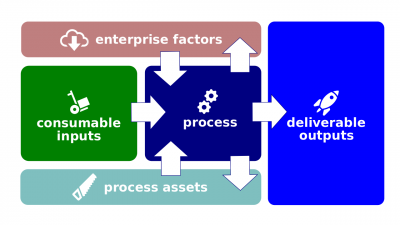Difference between revisions of "Process"
| Line 7: | Line 7: | ||
According to [[Juran's Quality Handbook by Defeo (7th edition)]], | According to [[Juran's Quality Handbook by Defeo (7th edition)]], | ||
:[[Process]]. Set of interrelated resources and activities that transform inputs into outputs. | :[[Process]]. Set of interrelated resources and activities that transform inputs into outputs. | ||
| + | According to the [[BABOK Guide|BABOK Guide (3rd edition)]], | ||
| + | :[[Process]]. A set of activities designed to accomplish a specific objective by taking one or more defined inputs and turning them into defined outputs. | ||
==Repetative vs ad-hoc== | ==Repetative vs ad-hoc== | ||
Revision as of 07:35, 7 July 2020
Process (hereinafter, the Process) is a sequenced series, predefined, empiric, and/or merely chaotic, of activities undertaken in order to achieve particular results. Effort engineering defines that those activities convert inputs into desired outputs utilizing some process assets such as tools and techniques and while being influenced by some enterprise factors.
Definitions
According to Organizational Behavior by Robbins and Judge (17th edition),
- Process. An action that individuals, groups, and organizations engage in as a result of inputs and that leads to certain outcomes.
According to Juran's Quality Handbook by Defeo (7th edition),
- Process. Set of interrelated resources and activities that transform inputs into outputs.
According to the BABOK Guide (3rd edition),
- Process. A set of activities designed to accomplish a specific objective by taking one or more defined inputs and turning them into defined outputs.
Repetative vs ad-hoc
Processes may be repetitive or ad-hoc ways of work. Non-repetitive processes are called management processes. Repetitive processes that are performed by people for enterprises are called business processes; those of their sets that produce a deliverable are called operations. Repetitive processes that are performed by systems including computers, robots, and/or machines are called system processes.
